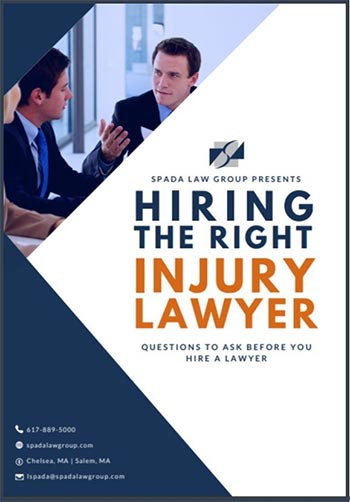One of the best times to ride a bike in Massachusetts is the fall. If you live near Boston, there is nothing like riding on the Esplanade along the Charles River and enjoying all the fall colors. The trees are bright red, yellow, and orange; and you can spot the crew teams practicing in the river.
Not only is the summer heat gone, but there is a whole new scene to take in. Fall in New England is simply unmatched.
But what happens in late autumn when all the leaves fall off the trees?
Why is Fall More Dangerous for Massachusetts Cyclists?
Two words: wet leaves.
The leaves are pretty in the trees, but once they start falling, they create several hazards for cyclists. One of the biggest dangers of wet leaves is that they can eliminate any traction you have with your tires and lead to skidding and falls.
One of the dangerous things about wet leaves is you may not know they’re wet to begin with. Leaves don’t only get wet from the rain; they can also get wet from frost. If the temperatures drop enough at night, there is a good chance of frost on the roads or leaves that may melt by the time you’re out cycling.
Precipitation generally leads to an increase in bike accident incidents. Local data indicates that bike accidents increase by more than 3x from when there is no rain or drizzle to when there is over 1.5” of rain.
Fresh leaves are one thing, but leaves also present another form of danger as they decompose in the streets and bike lanes. As leaves decompose, they create a greasy film that becomes slippery, especially when mixed with frost or water. The more leaves are driven on and crushed by bikers and cars, the more slippery they can become.
Leaves also pose another danger: they cover up curbs or potholes that could be catastrophic. If you pass through leaves at a regular cycling speed, you may be surprised by potholes that could cause you to fly off your bike. Another reason it is so pivotal to ride through leaves slowly is that you never know when they could be covering a pothole or another type of road hazard.
 Unfortunately, a very close friend of mine was seriously injured in a cycling accident last year and fallen leaves were a major contributing factor. My friend was riding on pavement that was littered with fallen leaves. He did his best to avoid them but traffic patterns made it impossible to avoid them completely. As he rode over one area of leaf-covered road, his front tire caught a hidden pothole, sending him head over the handlebars. He used his left arm to protect his head as he tumbled to the pavement and in the process, fractured his elbow and required surgery. The photograph above is an x-ray of his surgically repaired arm. So, my point here is the risk of hidden dangers is real and should be taken into consideration before heading out on the roads this time of year.
Unfortunately, a very close friend of mine was seriously injured in a cycling accident last year and fallen leaves were a major contributing factor. My friend was riding on pavement that was littered with fallen leaves. He did his best to avoid them but traffic patterns made it impossible to avoid them completely. As he rode over one area of leaf-covered road, his front tire caught a hidden pothole, sending him head over the handlebars. He used his left arm to protect his head as he tumbled to the pavement and in the process, fractured his elbow and required surgery. The photograph above is an x-ray of his surgically repaired arm. So, my point here is the risk of hidden dangers is real and should be taken into consideration before heading out on the roads this time of year.
4 Main Dangers of Wet Leaves for Massachusetts Cyclists:
- Sliding: wet leaves can cause you to slide, especially when you’re making a turn.
- Skidding: wet leaves can easily cause you to skid when you brake on them.
- Traction: wet leaves can cause you to lose traction, especially if you’re accelerating or going up or downhill over leaves.
- Hidden hazards: leaves can also cover dangerous conditions such as potholes.
Wet Leaves Safety Tips for Cyclists:
- Increase your stopping distance and plan to stop very slowly.
- Be especially cautious with turns, as you’re more likely to slip on a bend, and sometimes leaves accumulate most around turns. Do your best to avoid all sharp turns.
- Check the weather: remember that fall nights can bring frost, so leaves may still be wet and slippery even if it hasn't rained in a few days.
- Avoid accelerating and braking on leaves altogether if you can.
- Check out this blog for more fall cycling trips in New England.
The 6 Most Common Causes of Bike Accidents Year Round in Massachusetts:
According to the National Highway Traffic Safety Administration (NHTSA), the following are the top causes of cyclist injuries nationwide:
- Getting hit by a car (causes 30% of bike accident injuries)
- In the greater Boston area, however, local data indicates that nearly 80% of all bike crashes involve a motor vehicle.
- Falling off a bike (causes 17% of bike accident injuries).
- Bad road conditions (causes 13% of bike accident injuries).
- Cyclist error (causes 13% of bike accident injuries).
- Crashing or Colliding with a fixed object (causes 7% of bike accident injuries).
- Dogs running out in front of cyclists (causes 4% of bike accident injuries).
Boston cyclist data also indicates the following:
- Bike accidents have a pronounced peak of occurrence around 3 pm.
- The warmer the weather, the more likely an accident is (this is likely because warmer days, especially in the fall, mean more people are cycling). When the weather is above 50º F, accidents tend to rise.
- May through November are the months when bike accidents happen most frequently in Massachusetts.
According to the Boston EMS Cyclist and Pedestrian Report, there were 306 documented bicycle incidents in the greater Boston area in 2020, with 217 accidents requiring cyclist transportation to an area hospital.
Injured On A Bike In Massachusetts? Our Chelsea And Peabody Bike Accident Attorneys Offer FREE Consultations
As cyclists ourselves, we know the joy that cycling brings. But as injury attorneys, we also know about the dangers of cycling in Boston and beyond with less-than-friendly Massachusetts drivers.
If you were injured in a bicycle or e-bike accident, Spada Law Group’s injury attorneys can work to protect your legal rights. We have three offices but proudly serve the entire state with the ability to meet with you remotely from the comfort of your own home. Contact us for a free consultation so we can learn more about your bike or e-bike injury case and see how we can help you get the recovery you deserve after your accident.



